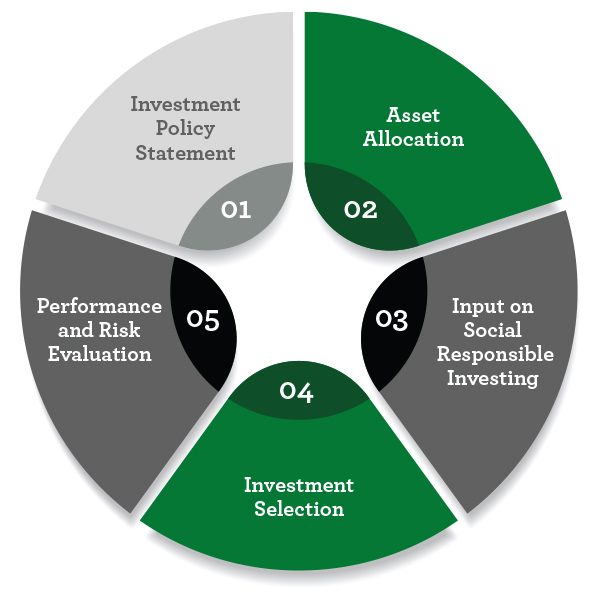Institutions and non-profits have unique goals and objectives. The Fitzpatrick Group begins with a deep dive into an organization’s values, mission, and financial objectives. Next they seek to help construct an investment plan integrating those unique values and objectives.


Investment Policy Statement (IPS)
The Fitzpatrick Group begins with a thorough discussion of an organizations financial objectives, time horizon, risk tolerance, and more, to help construct an IPS that serves as the “roadmap” for all concerned.
Risk Posture Assessment
They conduct a detailed survey of a Boards willingness to accept risk to use as a framework for asset allocation inputs.
Asset Allocation
Assist in constructing an asset allocation strategy based upon the objectives and risk tolerance established in the IPS. A diversified portfolio is designed to help reduce volatility over longer periods of time.
Investment Search and Selection
The Fitzpatrick Group leads a thorough discussion of your investment choices to fit the asset class determined in the asset allocation strategy.
Plan Evaluation
Review and evaluate the performance of the plan on a composite and account-level basis. Active fund managers are reviewed against relevant benchmarks and peers on a risk-adjusted basis. The current asset allocation versus its target policy is reviewed to see if a rebalance may be warranted.
Guidance on Socially Responsible Investing/ ESG
Socially Responsible Investing is often a key component of institution's investment plan. Sustainable investing has gained in popularity as investors and institutions seek to align their investments with their values. One way to participate in this is to use an investment approach that focuses on environmental, social, and governance criteria, known as “ESG.”
Sustainable or social impact, investing, focuses on companies that demonstrate adherence to environmental, social and corporate governance E.S.G. principles, among other values. There is no assurance that social impact investing can be an effective strategy under all market conditions, or that a strategies holdings what exhibit positive or favorable E.S.G. characteristics. Different investment styles tend to shift in and out a favor. In addition, an investment social policy could cause it to forgo opportunities to gain exposure to certain industries, companies, sectors, or regions of the economy, which could cause it to under perform similar portfolios that do not have a social policy.
Sustainable or social impact, investing, focuses on companies that demonstrate adherence to environmental, social and corporate governance E.S.G. principles, among other values. There is no assurance that social impact investing can be an effective strategy under all market conditions, or that a strategies holdings what exhibit positive or favorable E.S.G. characteristics. Different investment styles tend to shift in and out a favor. In addition, an investment social policy could cause it to forgo opportunities to gain exposure to certain industries, companies, sectors, or regions of the economy, which could cause it to under perform similar portfolios that do not have a social policy.
